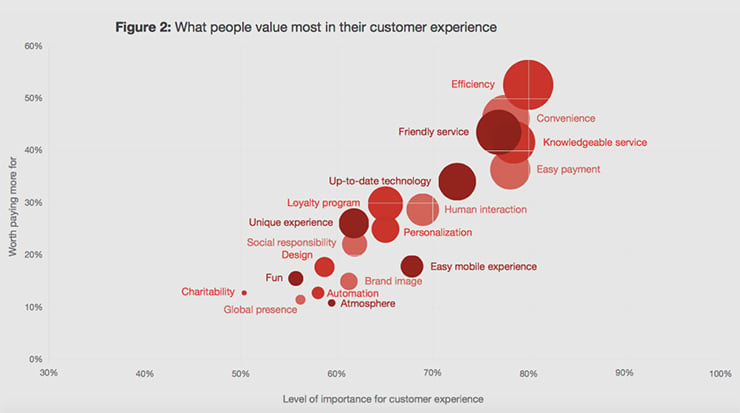

2020 looks like an exciting year for digital marketers! In this article, we’ll take a look at the top trends that we predict will be driving marketing strategy over the next 12 months, from AI to influencers, from “naked emails” to unified identities, and from customer experience to employee engagement.
Marketing expert Michael Brenner is confidently calling 2020 the “year of the customer”. Customer experience (CX) isn’t a new trend, but it’s all set to define marketing strategy this year. 73% of US customers cite customer experience as a key factor in their purchasing decisions – but less than half of them feel that today’s companies are providing the kind of experience they’re looking for. So, how can marketers stand out from the crowd?
Judging from this graph by PwC, the main areas to focus your attention include the usability of your site, especially the buy page; increasing your operational efficiency; and making sure that customer-facing staff are knowledgeable and friendly – which brings us to our next point.

Staff training and operations might not sound like they come under the marketing remit, but the fact is that in 2020, everyone’s a marketer. In other words, businesses need to shift from thinking about marketing in terms of promotions, events, and ads, to a more holistic, whole-organization approach.
Today’s highly informed customers are basing their purchasing decisions e people who’ve worked on it. The top reason that today’s consumers will switch brands? “Bad employee attitudes,” says the research team at PwC. In that context, employee engagement is no longer just the concern of the HR department – suddenly, your employees are your new brand ambassadors.
Creating motivated, well-informed teams who love working for you and want to tell the world is hardly something that can be done overnight – but in fact, your marketing team can help. Invest time and money in improving your internal communications, messages, and brand; make sure that everyone understands the “why” of their jobs, rather than just the “what” and “how”; and offer extensive training to anyone who interacts with customers.
Competitive advantages are getting increasingly hard to maintain. It’s easier than ever for the competition to figure out what you’re doing – and copy it. Technology advantages are tougher to protect as software prices come down, and low-cost options flood the market; features are easier than ever to reverse engineer; marketing advantages are hard to keep up now that anyone can talk to the market over social media for free. Brands, on the other hand, are becoming increasingly valuable.
Marketing guru Neil Patel calls brands, both personal and corporate, a “strong moat” for 2020 and in the future – the unique competitive advantage that will help keep your business safe for the long haul. And this doesn’t only apply to B2C marketing - Patel puts the success of his ad agency down to his carefully constructed personal brand.
While the first three trends we’ve looked at are more relevant for global marketing strategy, there are also exciting developments on the tactical side of digital marketing, thanks to evolutions in marketing technology.
Business intelligence software and AI-based marketing technology are moving into the mainstream in 2020. No longer reserved for major corporations, even brands with smaller pockets will be getting in on the action. While Google Analytics is a great tool, it simply can’t cope with all the complexities of selling online in today’s marketplace. Understanding where your customers came from is more important than ever – so you need a software that can track more complicated buyer journeys.
Business intelligence software can also tell you about what your customers do after they’ve bought from you – think upsells, downsells, and repeat purchases, for starters.
For SaaS companies in particular, this information is crucial to building a better marketing strategy. What’s more, analytics solutions like Amplitude can tie into your CRM, so you can get a much clearer picture of your leads and customers from the beginning to end of the purchase cycle. For those on a tighter marketing budget, even free tools like Google Data Studio could be a great place to start.
Learning more about your prospects is essential for keeping ahead of the competition – but, digitally speaking, this can be harder than it sounds. How can you know, for instance, that the John Smith who downloaded your e-book with his personal email is the same lead that is interacting with your sales team via Facebook messenger?
Enter identity marketing software, another big trend for 2020. Software products like Neustar help marketers get what they call a 360-degree view of customers, tracking their behavior across social media, email, search engines, and even offline – all while staying on the right side of GDPR and avoiding the dreaded creep factor.
Predictive marketing analytics are on the rise this year; in fact, the market is expected to reach $10.95B by 2022. Predictive analytics tools scan customer data to spot patterns in behavior and help anticipate results.
For instance, predictive software could suggest the best messaging sequence for customers at a particular stage in the buyer journey, or identify which channel is likely to work best to reach your customers. While these tools have been used by large companies for a few years now, in 2020, they are likely to become far more affordable and therefore more widely used.
Listening to your customers is always important – but in 2020, we mean that literally. Voice search and voice purchasing are on the rise; in fact, over 50% of all searches in 2020 are predicted to be done by voice. Digital marketers will need to make sure their sites are voice search optimized; tools like Jetson AI help people find your site and purchase using voice only.

There are plenty of new developments coming up this year in the field of email marketing. While click rates may be going down, email is far from dead - but it might look a little different in 2020.
For starters, more and more email marketers are sending “naked emails” – text-only emails with no formatting, no visuals, and no design work. Email copy expert Joanne Weibe suggests that to stand out in today’s crammed inboxes, marketers need to do things that seem a little different and off-the-wall – and that might just be emails that look like a friend sent them.
Interactive emails are another promising trend for 2020. Google AMP lets you send customers dynamic emails that have app functionality embedded into the email – think, for example, of booking a hotel inside your inbox, or answering a Doodle poll without exiting the email. Antony Malone of Booking.com calls it “the biggest thing happening to email since the creation of email.”
So far, 2020 looks like a big year for digital marketing. But it’s important to remember that trends can be fleeting. Real marketing results come from a solid foundation of a digital marketing strategy, a deep understanding of your customers’ needs, and a great product or service.
If you’d like to learn more about how Spot On could help you create a digital marketing strategy that will stand the test of time (along with helping you follow the trends that make sense for your business), click here to set up a free, no-strings consultation call with one of our marketing experts.


Rebecca Graves co-founded Spot On in 2012. As a partner and leader of client services, she takes immense pride in being in charge of “client happiness.” The role allows her to wield her problem-solving skills while fostering big-picture perspectives and team building. Rebecca’s more than 35 years of experience have equipped her to translate strategic planning expertise for the advancement of tech companies transforming the healthcare, financial, and legal industries.
Get the latest and greatest posts sent straight to your inbox.


